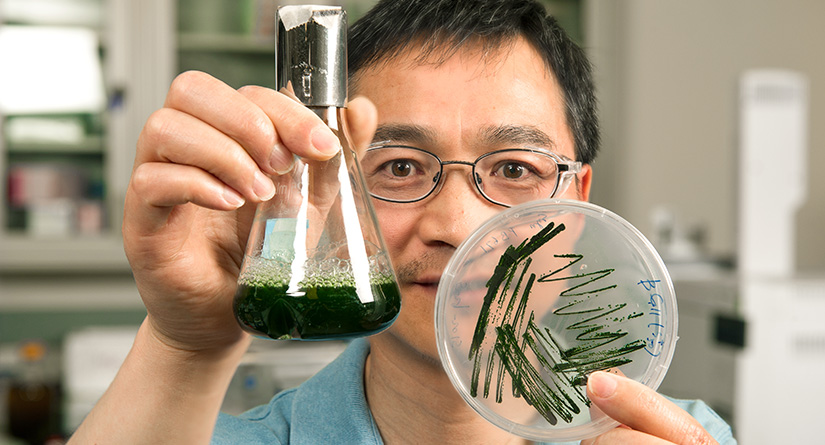NREL Partners With Academic Institutions To Boost Fundamental Research Training and Capacity at US Universities
DOE Office of Science-Funded Programs Connect NREL Researchers With Faculty and Students From Historically Underrepresented Institutions

The U.S. Department of Energy (DOE) Office of Science has announced $67 million in funding for 71 projects through a pair of initiatives to train students and early-career researchers and build basic science research capacity at academic institutions that have historically been underrepresented in the Office of Science portfolio. These institutions include emerging research institutions (ERIs) and minority-serving institutions (MSIs).
The Reaching a New Energy Sciences Workforce (RENEW) initiative ensures that the next generation of scientists and engineers have the skills and expertise required for the research workforce of the future. RENEW creates training opportunities for students and postdoctoral researchers at academic institutions that have traditionally been underrepresented in Office of Science programs by drawing support from DOE national laboratories and other research infrastructure. The FAIR initiative builds research capacity at these academic institutions by developing infrastructure and faculty expertise through relationships with established research institutions, Office of Science facilities, and national laboratories.
Researchers at the National Renewable Energy Laboratory (NREL) are working with students and faculty at five MSIs on research projects funded through RENEW and FAIR. These projects are aligned with the Office of Science's Basic Energy Sciences (BES) and Biological and Environmental Research (BER) programs. The BES program supports basic scientific research to establish the foundations for new energy technologies and to advance DOE missions in energy, environment, and national security. The BER program seeks to understand complex biological, earth, and environmental systems with the aim of advancing the nation's energy and infrastructure security, including the reengineering of microbes and plants for energy and other applications.
"It's exciting to build relationships with academic institutions that haven't traditionally been connected with NREL or the Office of Science," said Jianping Yu, a senior bioenergy researcher at NREL who has now partnered with universities on both FAIR and RENEW subawards. "We'll need more talented young scientists working on basic research as our energy needs grow, and FAIR and RENEW let us help create opportunities for more students to gain experience and grow into these careers."
In December, RENEW funded 29 projects, including three with NREL researchers serving as partners with faculty at underrepresented research institutions.
Yu will partner with faculty and students at Alabama State University, a historically Black university, to develop a cyanobacteria research training program through a RENEW subaward. In this program, students and early-career researchers will be able to advance biotech applications for cyanobacteria and microalgae with carbon-uptake capabilities.
Under a different RENEW subaward NREL helped an academic institution secure, computational science researchers Ignas Satkauskas and Julie Bessac will partner with City College of New York, an MSI-designated Asian American and Native American Pacific Islander-serving institution (AANAPISI) and Hispanic-serving institution (HSI), to train students in understanding the physics of natural hazards and to develop applications for workforce development in natural hazards research. AANAPISI is a designation for higher-education institutions with an enrollment of at least 10% Asian American or Native American Pacific Islander full-time students, and HSI is a designation for institutions with at least 25% Hispanic full-time students.
NREL researchers Vivek Bharadwaj, Bennett Addison, and Nicholas Rorrer will partner with the University of Massachusetts Lowell on a RENEW subaward to develop a research training program for students focused on building a robust and diverse workforce in the polymer sciences by exploring the foundational science of polymer interactions with supercritical fluids for a circular economy. The University of Massachusetts Lowell is an AANAPISI.
FAIR announced $31 million in funding in November 2024 for 42 projects, including two with NREL researchers serving as partners.
NREL electrochemistry researcher Shaun Alia is supporting a FAIR award led by Texas State University to build research capacity in oxygen evolution reaction electrocatalysts, a pathway to creating green hydrogen. NREL solar photochemistry researcher Justin Johnson is a partner on a FAIR award to Rutgers University–Newark focused on developing and characterizing new porous frameworks for photocatalysis. Texas State University is an HSI, and Rutgers University–Newark is both an AANAPISI and an HSI.
This is the second year in a row since the inception of FAIR that NREL researchers have partnered with universities through the initiative and the third consecutive year for RENEW partnerships since it was launched in 2022. In 2023, Yu and Matt Beard worked with universities on FAIR projects. Yu partnered with Oklahoma State University, an ERI, and Beard partnered with San Diego State University, designated as both an AANAPISI and an HSI. In 2023, Melissa Gish, Wade Braunecker, and David Mulder partnered with Metropolitan State University of Denver (an HSI), and in 2022, Bryan Pivovar and Shaun Alia partnered with Universidad Ana G. Méndez Gurabo Campus (also an HSI) through successful RENEW awards.
Learn more about NREL's contributions to basic energy sciences research and our bioenergy research and development work.
This article has been updated to reflect an editorial change made after its original publication.

